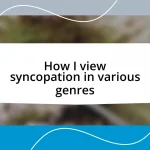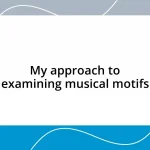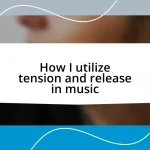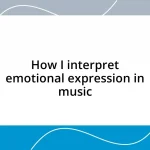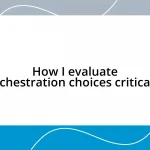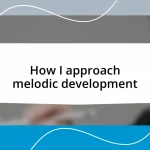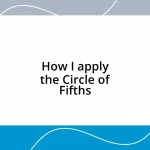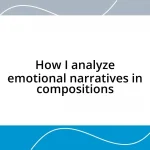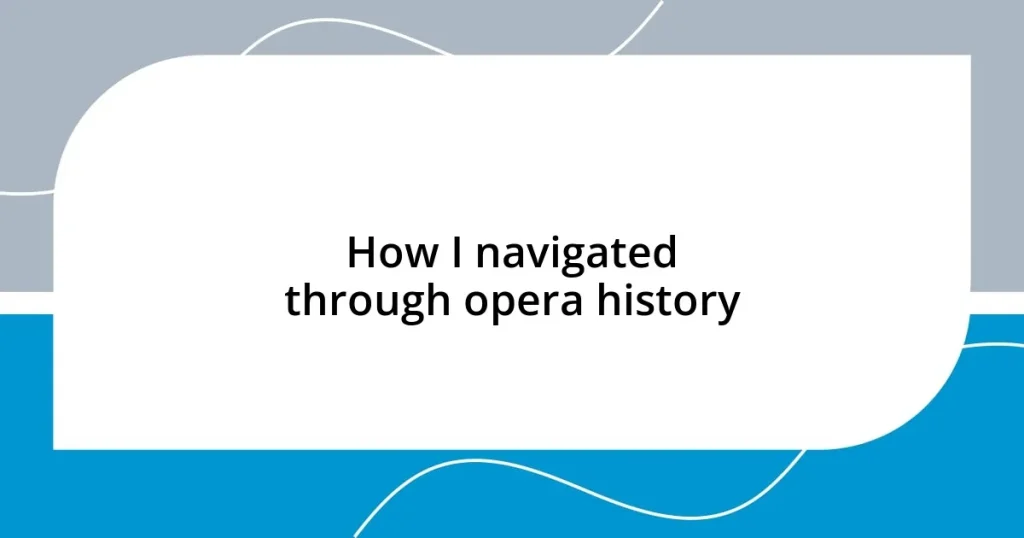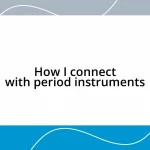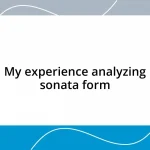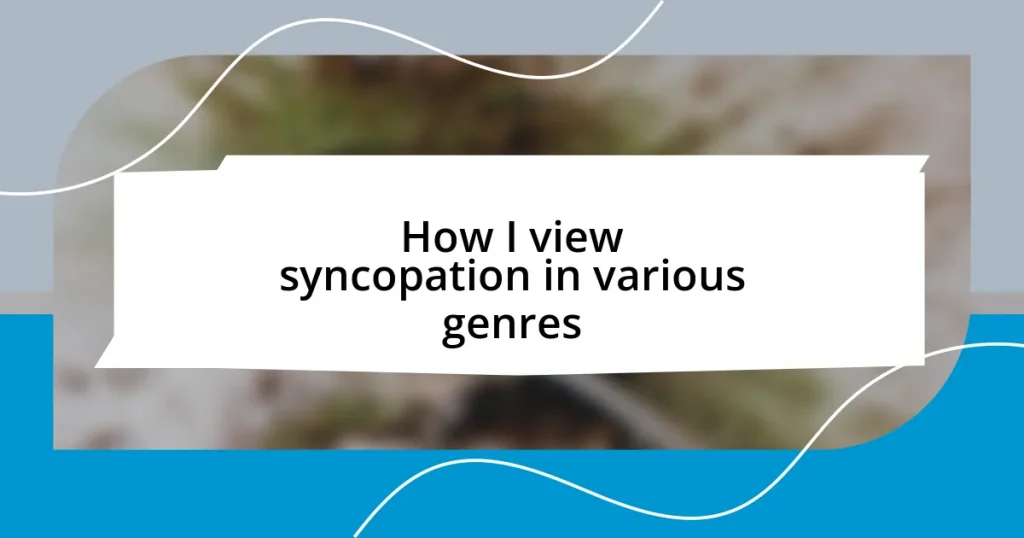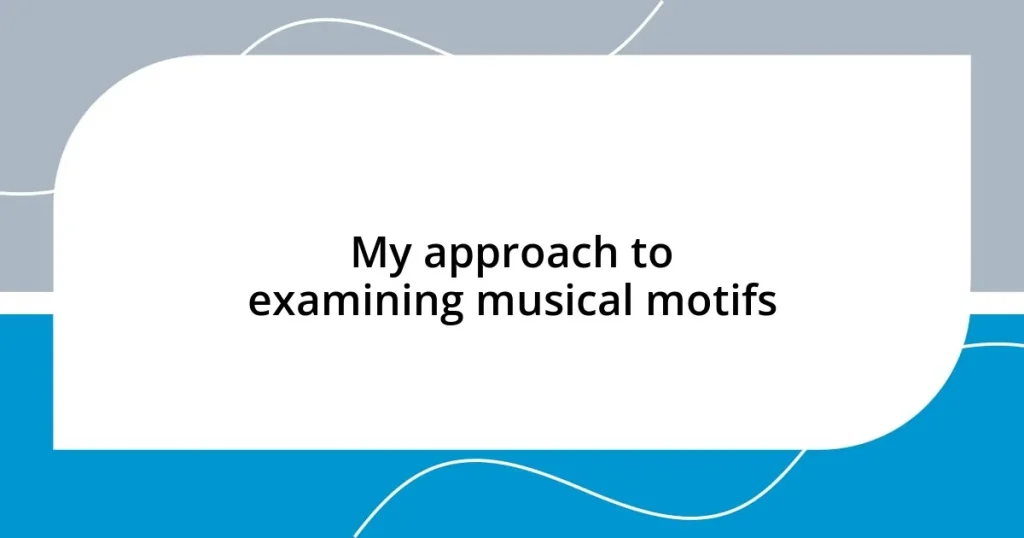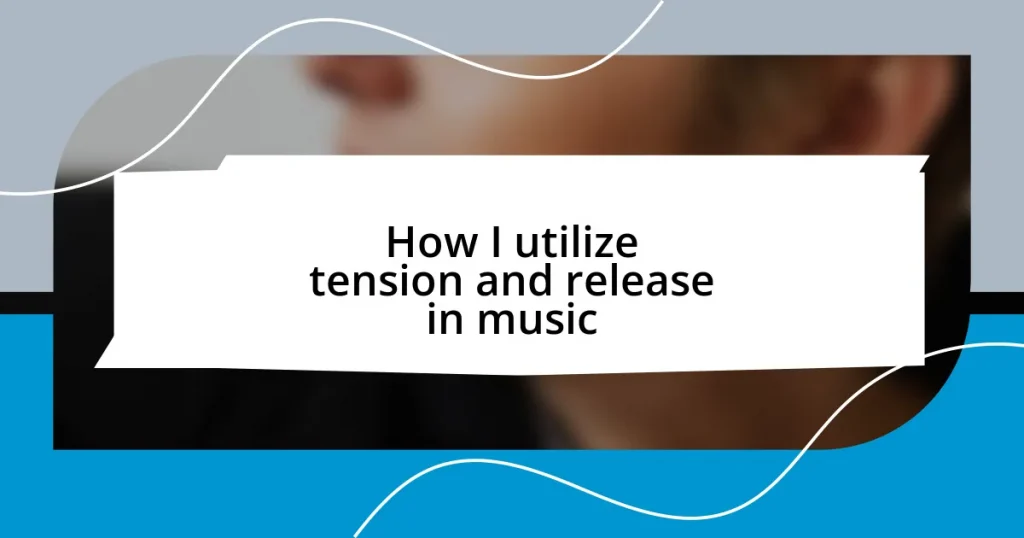Key takeaways:
- Opera history reflects societal changes, with movements from Baroque to Modern influencing emotional and cultural expression.
- Key composers like Puccini, Wagner, and Verdi significantly shaped operatic storytelling through their emotional depth and innovative approaches.
- Significant works such as “Eugene Onegin” and “Carmen” highlight universal themes of love, desire, and consequence in human experiences.
- The future of opera appreciation may thrive through technology, innovative storytelling, and integration into educational programs, fostering broader engagement.
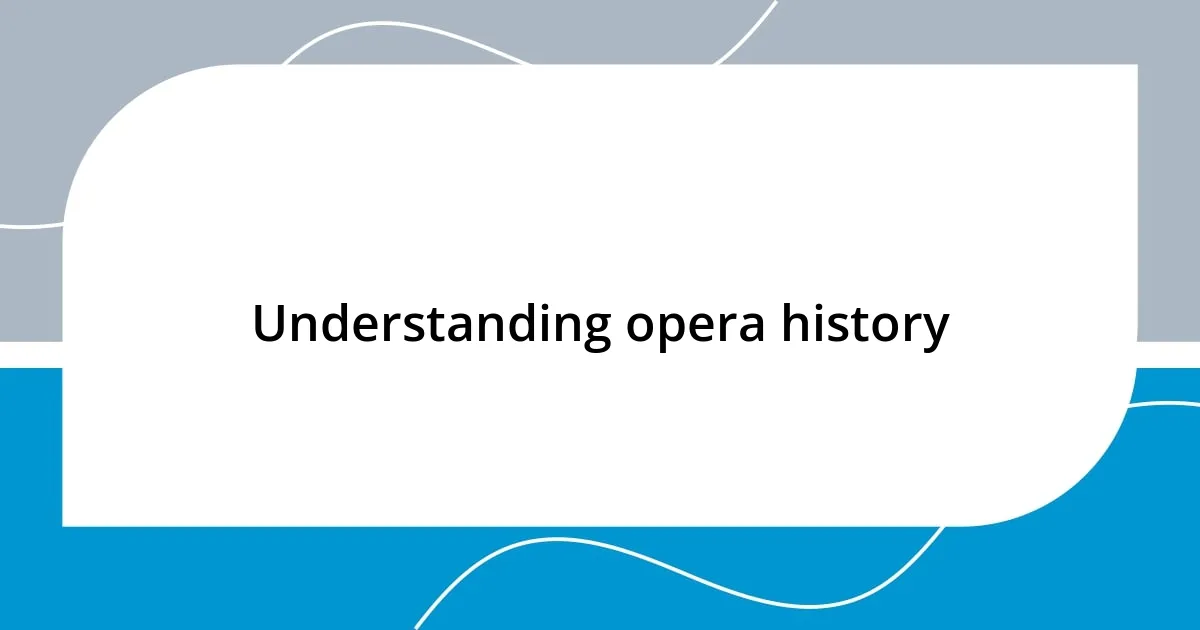
Understanding opera history
Opera history is a fascinating tapestry of cultural evolution and artistic expression. I remember the first time I sat in an opera house, mesmerized by how centuries of tradition unfolded on stage, blending music, drama, and stunning visuals. Have you ever wondered how this unique art form evolved from its humble beginnings in Italy during the late 16th century?
As I delved deeper into the annals of opera, I discovered that it wasn’t just about the music; it was a mirror reflecting societal changes, shifting power dynamics, and emotional depths. For instance, the resurgence of interest in Greek mythology in the late Renaissance gave rise to operas that explored human experiences in profound ways. It struck me that each composer’s unique voice contributed to a rich dialogue across generations.
Understanding opera history means appreciating milestones like the transformation from Baroque grandiosity to the more intimate expressions of Romanticism. I recall feeling a profound connection during a performance of Verdi’s works, realizing how his operas captured the human spirit, embodying love, loss, and resilience through melodic storytelling. Isn’t it incredible how these narratives continue to resonate with audiences today?
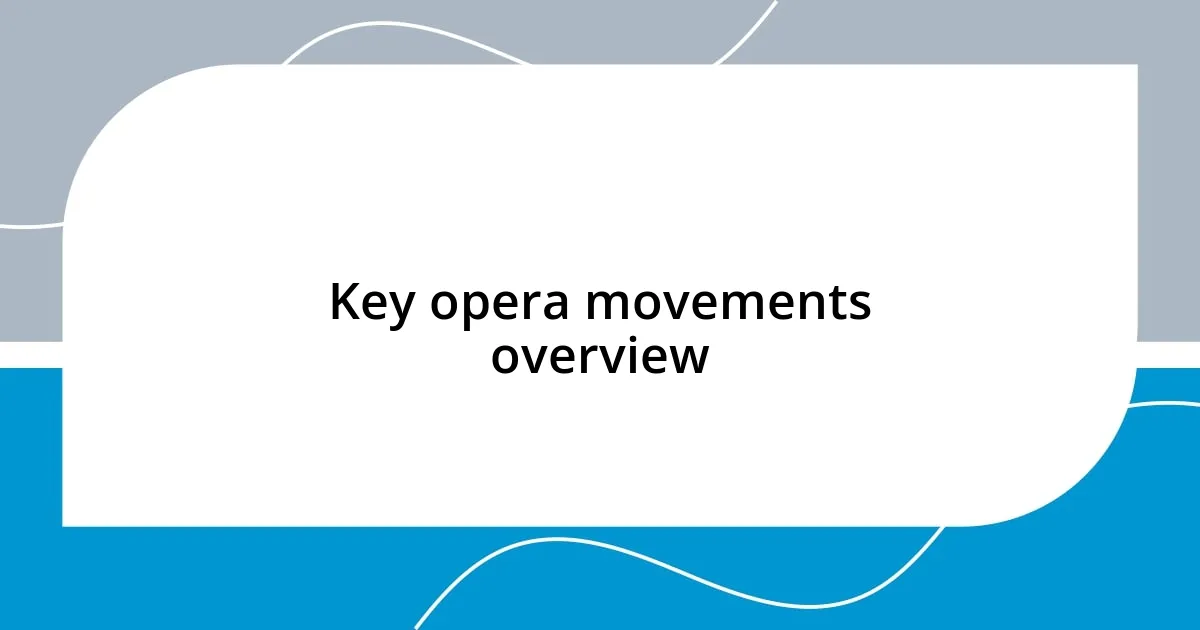
Key opera movements overview
When exploring key opera movements, it’s striking to see how each period reflects the artistic desires of its time. From the overly ornate Baroque style to the emotional depth of Romanticism, each movement offers a unique lens through which to appreciate both music and culture. I remember sitting through a performance of Wagner, completely enveloped by the lush orchestration and dramatic storytelling, feeling myself transported to another realm entirely.
Here’s a brief overview of significant opera movements:
-
Baroque (1600-1750): Characterized by grandeur and complexity, composers like Monteverdi and Handel pushed the boundaries of emotional expression.
-
Classical (1750-1820): This period saw a focus on clarity and structure, with Mozart’s operas weaving together intricate plots and unforgettable melodies.
-
Romantic (1820-1900): Emphasizing individual emotion and nationalistic themes, composers like Verdi and Puccini created operas that resonate deeply with personal experiences.
-
Modern (20th Century): Breaking away from tradition, composers such as Stravinsky and Britten experimented with new forms and styles, reflecting a rapidly changing world.
The evolution through these movements not only shaped the sound of opera but also revealed insights into human emotion and society. Each performance I attend echoes this sentiment, reminding me how intertwined art and life truly are.
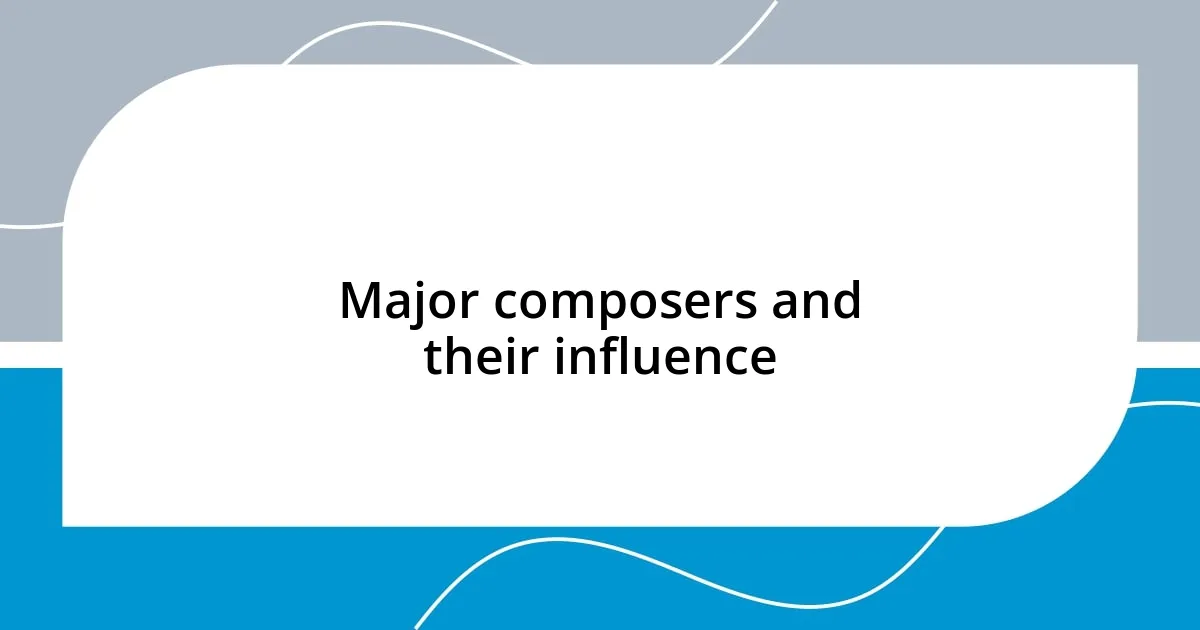
Major composers and their influence
As I reflect on the major composers who have shaped opera, a few names consistently rise to the top. Take Giacomo Puccini, for example; his operas like “La Bohème” resonated with my own experiences of love and loss. I remember the first time I heard “Quando m’en vo’,” and feeling the melodies wrap around me like a warm embrace. His ability to blend intense emotion with beautiful music creates a shared human experience that transcends time.
Another pivotal figure is Richard Wagner, whose influence went beyond music to impact the very philosophy of opera. His concept of the Gesamtkunstwerk, or total artwork, truly redefined what opera could be. I recall the first time the immersive spectacle of “Die Walküre” engulfed me; the grandeur and depth were unlike anything I’d ever experienced. Wagner didn’t just create music; he forged an artistic experience that engaged multiple senses, creating a lasting legacy that inspires composers to this day.
Then there’s Giuseppe Verdi, a deeply passionate artist whose works often reflected the struggles and aspirations of everyday people. I vividly remember sitting in the audience during “Rigoletto,” feeling the tension and emotion wash over the crowd. Verdi’s ability to convey societal themes through music made his operas a powerful reflection of the human experience. His legacies are woven into the fabric of opera, making his works essential listening for anyone who seeks to understand the power of storytelling through music.
| Composer | Influence |
|---|---|
| Puccini | Defined emotional depth in operatic storytelling |
| Wagner | Established the concept of total artwork, merging music and drama |
| Verdi | Reflected societal themes and struggles through passionate melodies |
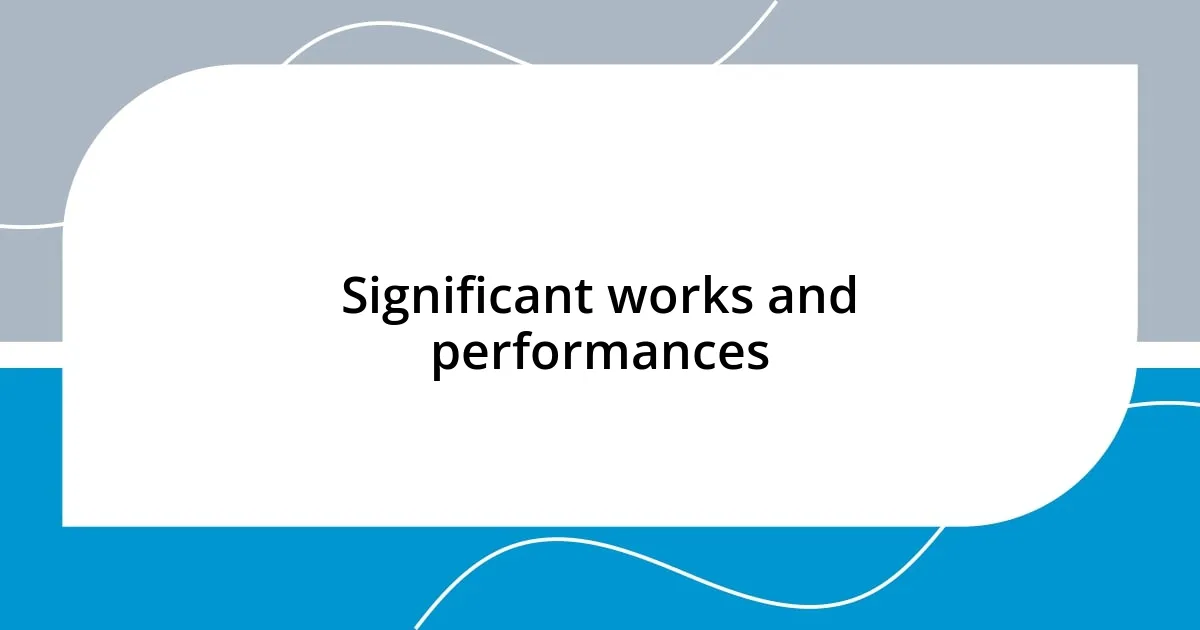
Significant works and performances
One of the most significant works that stand out in my mind is Peter Tchaikovsky’s “Eugene Onegin.” I stumbled upon this opera at a small concert hall, where the raw emotions portrayed on stage made me ponder the nature of love and regret. The haunting melodies lingered in my mind long after the final curtain fell, leaving me to reflect on how different life might be if we took chances more often.
Then there’s Bizet’s “Carmen,” which I experienced during a vibrant outdoor performance. I felt the pulse of the audience, their energy matching the fiery spirit of the lead character. This opera is a brilliant blend of passion and tragedy that raises a pivotal question: how often do we follow our desires, and what are the consequences of such choices? Those moments encapsulated in the music remind me of the universal struggle between freedom and constraint.
Lastly, I can’t forget about the impact of “The Magic Flute” by Mozart. Attending a production that creatively reinterpreted the visuals ignited my fascination with the potential of opera to transcend age and cultural barriers. The whimsical elements combined with profound themes of enlightenment felt almost like a revelation—who knew that such depth could emerge from a seemingly simple story? This performance underscored my belief that opera can indeed serve as a mirror to our own lives, inviting us to explore our inner worlds.
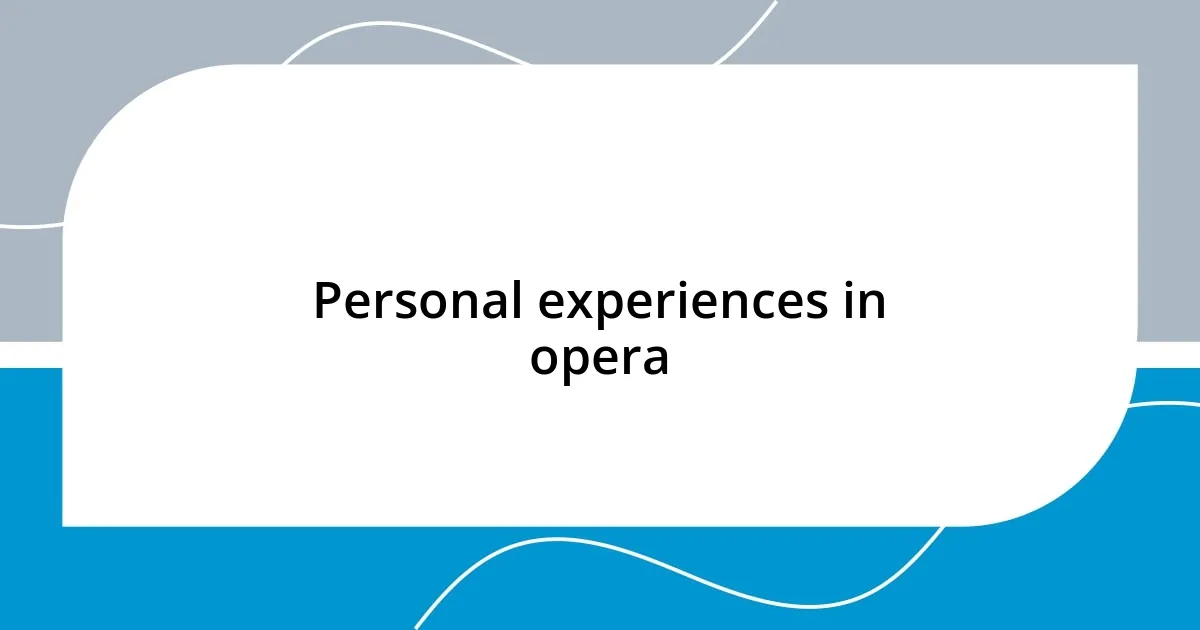
Personal experiences in opera
Attending my first opera was a revelation. It was “La Traviata,” and I still remember the chill that ran down my spine as the curtain rose. The lavish costumes and the grand stage set the scene, but it was the emotional weight of Violetta’s arc that truly captivated me. I couldn’t help but think—how could someone pour their heart out so beautifully, and how does that relate to my own experiences of love and sacrifice?
Another memorable experience was during a student production of “Madama Butterfly.” I was backstage, just a few feet away from the performers. I watched as the lead, trembling with emotion, delivered her aria. The connection between her and the audience was palpable. It made me question: what is it about opera that allows such deep emotional communication? Being that close, I felt like I could almost touch the intensity of her performance, and it was a reminder of how art can transcend words and connect us on a deeper level.
I also recall a particularly powerful moment during a contemporary opera piece that tackled social issues. I was in a small, intimate setting where every face reflects the audience’s raw reactions. As the characters grappled with their realities, I felt a shared sense of responsibility towards the themes being explored. It was one of those evenings that left me pondering for days afterward—how can we use the medium of opera to tell these important stories? Every note seemed to echo the struggles around us, reinforcing my belief in the transformative power of this art form.
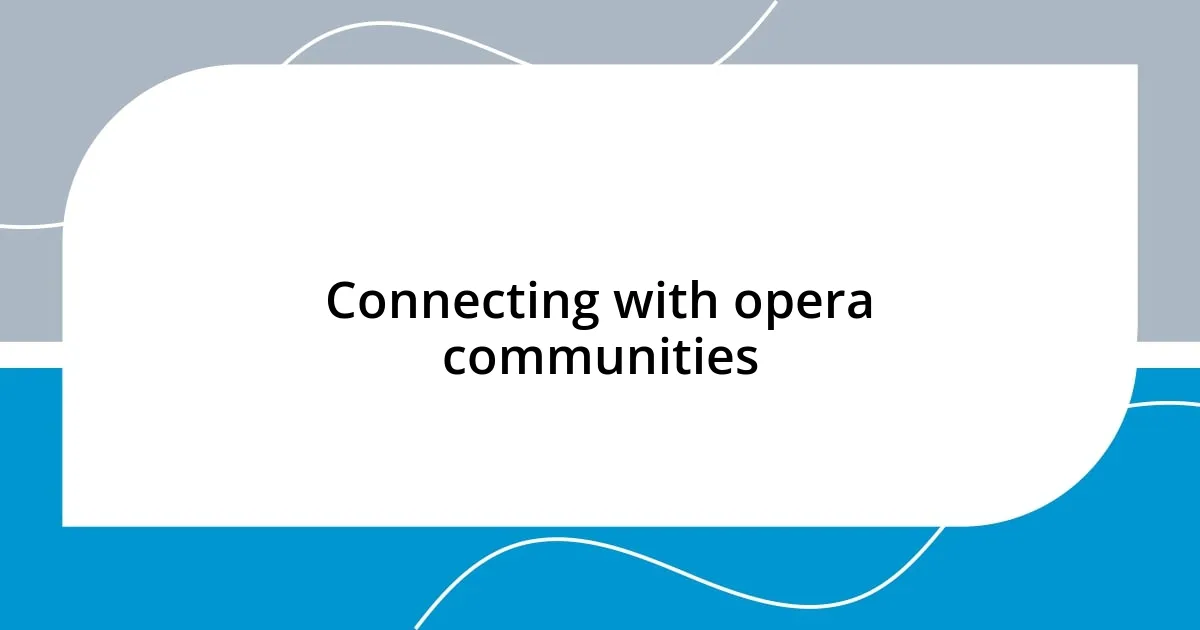
Connecting with opera communities
Connecting with opera communities has been a heartfelt journey for me. I vividly remember attending my first opera workshop, where I met fellow enthusiasts who shared my passion. The discussions we had felt electric, as if we were all piecing together a larger tapestry of musical storytelling. It made me realize how vital it is to engage with others—after all, isn’t the essence of art best explored through shared experiences?
Through social media platforms, I’ve found incredible communities focused on opera. I remember joining a lively Facebook group where members shared their favorite performances and insights. One member posted about a local opera’s interpretation of a classic piece, and my curiosity was piqued. Engaging in conversations about interpretations and personal reactions not only enriched my understanding but also fostered connections that I cherish. Who knew a simple comment could lead to lasting friendships?
Attending community opera events has opened my eyes to the diverse interpretations of this art form. At a local festival, I interacted with emerging artists, each with their own unique take on operatic traditions. I’ve often thought—what if everyone had the opportunity to connect like this? The conversations we shared about breaking away from conventional narratives and experimenting with new styles? That’s where innovation thrives, and it’s moments like these that remind me why I love being part of the opera community.
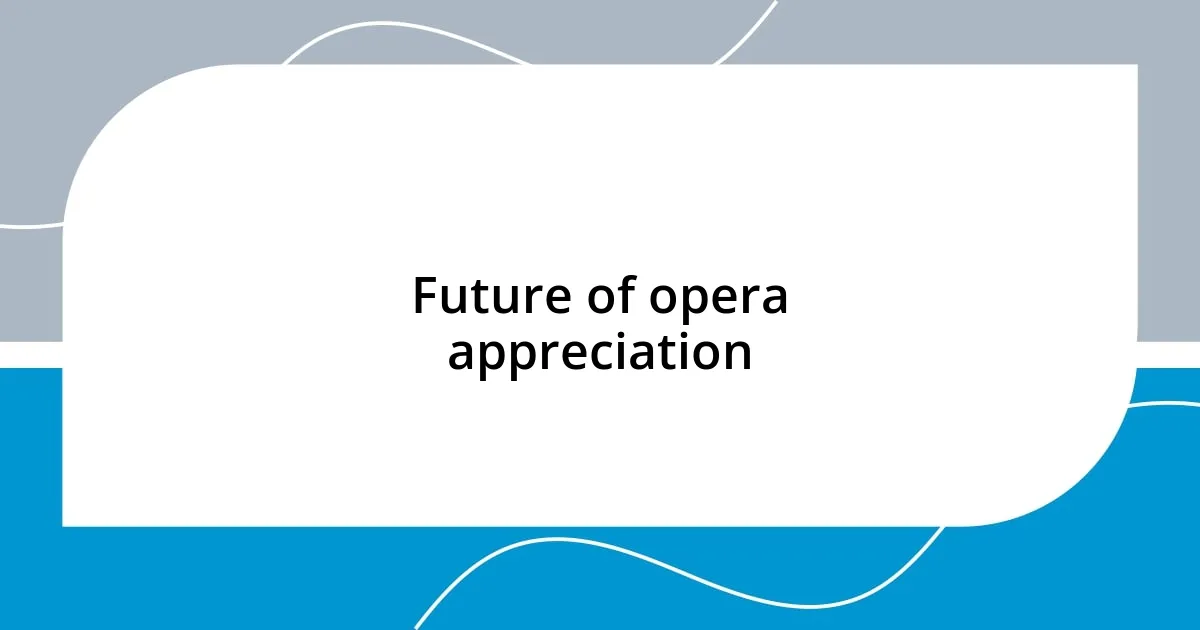
Future of opera appreciation
As I consider the future of opera appreciation, I find myself optimistic about how this art form could evolve. Recently, I attended a virtual operatic performance that featured diverse artists from around the world, all collaborating despite geographical distances. It was thrilling to see how technology can bridge gaps, allowing fresh perspectives and voices that challenge traditional narratives—what if this becomes the norm?
Moreover, new approaches to storytelling within opera excite me. I remember a daring production that reimagined a classic tale through the lens of modern social issues, blending stunning visuals with powerful music. This innovative spirit invites a broader audience, encouraging discussions that extend beyond the theater. How can we continue to push these boundaries while maintaining the essence of what makes opera so compelling?
The integration of opera into educational curricula offers another promising avenue. During a community outreach program I participated in, I saw young students experience opera for the first time. Their reactions were priceless—some were moved to tears, while others were inspired to create their own compositions. It made me reflect—what if every child had the chance to explore opera early on? By cultivating appreciation at a young age, we can ensure that opera remains relevant and resonates with future generations.

